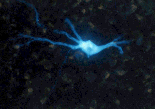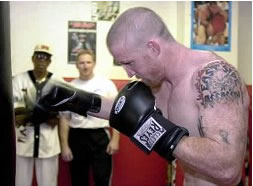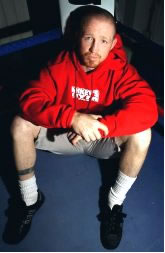

|
||||
Fight
of a Lifetime |
||||
| On his office walls are a magazine cover of himself in top form, photos of him in the boxing ring, a poster of his bodybuilding brother and a picture of his children. But next to the ring, the wall in Mikey Burnett's gym displays newspaper articles that chronicle the ugly side of the sport -- drug and alcohol dependence. Two pages from a Detroit newspaper follow 61 boxers from the city's top club, which turned out champs in the '70s, '80s and '90s. By 2001, only four of the 61 were wealthy. Just 35 were working. Four had their boxing careers knocked out because of drugs. Eight went to prison, mostly for drugs. Of the 10 who died, most were murdered and involved in drugs. The sport turns out more addicts than champions, Burnett said. Drugs and alcohol might have cost Burnett championships of his own, and he wants everyone who comes to his gym to know the danger. They nearly wrecked his family and business, Mikey's Gym at 11652 E. 21st St. But even when he hit bottom, he continued taking drugs. "Pretty soon you're not a fighter anymore," Burnett said. "Just a cocaine addict and Valium freak." Burnett managed to kick his addictions -- or the worst ones, at least. But not all addicts do. That raises the question: Why is quitting so hard? Your brain on drugs Addicts are tolerant, physically dependent and psychologically dependent on drugs. Even in the face of severe consequences, such as getting fired from work or kicked out of the house, they don't quit. "Addicts are people who can't always control when they start using drugs or when they stop," said David Friedman, a researcher at Wake Forest School of Medicine in North Carolina. "There's a real loss of control." When families of addicts hear addiction referred to as a disease, many of them view it as another excuse for their loved one's problem, said Steve Stewart, clinical director of 12&12, 6333 E. Skelly Drive. But he explains to them that addicts must act responsibly, just as a diabetic must take responsibility for that chronic disease with diet, exercise and insulin. "The disease concept does not conflict with personal responsibility," Stewart said. Addiction to illegal drugs, such as cocaine and methamphetamine, and legal ones such as cigarettes and alcohol, are equally hard to kick. Cigarettes might be even harder to kick because addicts see no immediate effects, such as a hangover; because there are no criminal issues; and because most people don't go through a treatment program to quit. Scientists around the world are studying drugs and the brain -- particularly a neurotransmitter called dopamine. Most animals' brains contain dopamine, which signals that basic needs such as food, sex and water are important, said Jason Jaworski, a scientist at Emory University in Atlanta who studies the effects of abused drugs. Drugs artificially stimulate the pleasure pathway in the brain, causing a high, Jaworski said, but drugs are much more potent than food, water and sex. "They throw that switch so much stronger than the natural re-enforcers like food," he said.
The area of the brain that deals with emotions, motivations and drives is called the limbic system. When people are hungry, the information is relayed to the limbic system so that they start looking for food. If a message is fun and exciting, that's coming from the limbic system, too, Friedman said. Scans of the brain show that drug addicts have fewer dopamine receptors. In cocaine addicts, the metabolism in the cerebral cortex is reduced. "Clearly, their brains are not responding to the world in the way a normal brain does," Friedman said. |
|
STEPHEN
PINGRY / Tulsa World To study the effects of drugs in humans, researchers study animals. When mice can choose either cocaine or sugar, they'll usually choose drugs, Jaworski said. Eventually, scientists have to remove the drug option or else the mice never eat or drink. "They definitely prefer drugs over food," he said. "They'll bang away at the cocaine lever and ignore the food lever." Animal models prove that drug addiction is a biological problem, not just a lack of will power. "We definitely have moved past call ing addiction
a flaw of character or morality," Jaworski said. Cue and A In the mix are cues that trigger a person to start taking drugs, Friedman said. Decades ago, a scientist named Pavlov proved that dogs associated meat with hearing a bell that usually sounded when they were fed. Soon they started salivating every time they heard the bell, even if meat didn't follow. For drugs, a cue could be an action as simple as waking up or driving in a car, if those were times when a person used to smoke cigarettes. A person who enters detox at a clinic would face strong reminders if he went back to his community and friends. An alcoholic might go to a bar with his friends planning to be the designated driver, only to relapse. Or a drug user might think he's going to his dealer's house just to talk, Stewart said. But the old environment and friends usually don't support recovery, he said. "It's important to replace them with new friends who are trying to do more things with their life than being an alcoholic or user," Stewart said. Burnett, who says he hasn't used drugs or alcohol for 18 months, believes some people might be more prone to addictions because of a perfectionistic personality that can cause relapse. Science backs up his theory because research shows that addiction is a compulsive behavior similar to compulsive shopping and eating. The orbital frontal cortex in the brain seems not to work right in people with such disorders. That's why they get stuck in certain behaviors, Friedman said. That perfectionism causes Burnett to bounce from one addiction to another, whether it's drugs, fitness or work. Another reason for relapse is that the deck is stacked against many addicts because of poor education, bad work experience, few job skills or a criminal record. Many have a dual diagnosis of addiction and schizophrenia, depression or bipolar disorder, Stewart said. Once they're sober, addicts have to face all the problems they've ignored for years and learn to cope with stress, Burnett said. Burnett made five serious attempts to quit -- including inpatient rehab -- over 20 years, but he always went back to drugs and alcohol. "It took me a while to realize life wasn't going to be easier because I was clean," Burnett said. Road to recovery Nor are most treatment programs studied to figure out which work best. But studies have shown the importance of incorporating spirituality and faith components in substance abuse treatment. Good treatment programs also prepare clients to deal with triggers, cope with their emotions and find support groups. They should also provide the appropriate level of care, whether that be inpatient, halfway house or outpatient care, Stewart said. The best recovery program provides services for years, not weeks. But no treatment program is guaranteed to work and none is easy. That's why Burnett encourages students in his amateur boxing program never to start drugs in the first place. "Why should we go find out if we're one of the ones who becomes a cocaine addict?" he said. In his healing process, Burnett, who still considers himself an addict, has let fighting -- along with coffee and chewing tobacco -- become his addictions. And he's careful not to set unreachable goals because the letdown could lead him back to drugs, he said. "I live day to day and try to remember there are
going to be highs and lows," Burnett said. "But now my highs
and lows have started to even out." Nellie Kelly, World Staff Writer, can be reached at 581-8475 or via e-mail nellie.kelly@tulsaworld.com |
||
| Home | Register | Future Workshops | Past Workshops | Science Update | Links | Glossary | About |
Last Revision
info@addictionstudies.org

